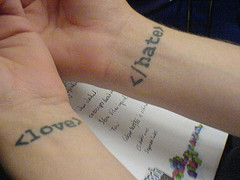
Other than a few extra pine needles on my car, and a couple of small branches down in my neighbor's yard (she doesn't do a good job of trimming in the fall anyway,...
This Living Hand
This living hand, now warm and capable
Of earnest grasping, would, if it were cold
And in the icy silence of the tomb,
So haunt thy days and chill thy dreaming nights
That thou wouldst wish thine own heart dry of blood
So in my veins red life might stream again,
And thou be conscience-calmed--see here it is--
I hold it towards you.John Keats
Edwina Froehlich, founding mother of La Leche League, died in 2008, and The New York Times has published a profile of her in this year's edition of The Lives They Lived, the Magazine's annual tribute to those who passed in each year.
I enjoyed reading a tribute to Froehlich, but I was troubled by the way it was written, and it got me thinking about what happens when rights are fought for, won, and then taken for granted.
Relating how Froehlich and her friends -- all white, middle class suburban mothers of young children -- came together to share information about breast feeding and its benefits to mother and child, Bazelon (the author of the NYT profile) writes:
They insisted that breast-feeding was better than the bottle — more natural, more nutritional, more sustaining of deep mother-baby attachment — long before the feminist health movement or the medical establishment did so.
It seems odd to me to set these women apart from "the feminist health movement," as it is clear that to whatever extent there was a feminist health movement at the time, they were certainly a part of it. Bazelon also mentions that "Froehlich and her friends also read Betty Friedan’s Feminist Mystique and thought of themselves as early feminists."
This is where I start to get a little tetchy. Early feminists? In the 1950s? Really?
So what were all the women and men doing in the hundreds of years of struggle and progress up until the "real" feminist movement, which I assume I am to consider having occurred during the 1960s and 1970s? What were John Stuart Mills, Mary Lyon, Susan Anthony, Emma Goldman, Lucy Stone, and countless other women doing all that time? What of their accomplishments? And that's just shaking loose a few of my heroes -- which betrays a decided bent towards the white, middle class, 19th century anglo lady as well. What about all the ones who didn't make it into my own, equally limited, library?
The story of La Leche, as told in the profile, is the story of some quaint, hardy outliers whose cause was ultimately taken up and made mainstream by the feminist movement of the 1970s, which is unfortunately presented as the long-awaited culmination of all that had preceded it, as is so often the case with events that occurred in the youth of the baby boomer generation.
In reality, the women of La Leche were doing what every generation must do: question the received wisdom of the day, listen to their own consciences, and act accordingly. They were doing more than just laying in another brick for the 1970s movement to stand on, they represented an important shift during a terrifically conservative time in US history, one that constrained women's roles considerably from the freedoms of only a generation before.
It might seem like I am asking for a broader view of history, a more inclusive one that acknowledges the work of previous generations as something more than simply a prelude to our own generation's triumphs. And I am, but I am actually asking for an acknowledgement of something much more than that.
That each generation gives away some of the wins of previous generations, leaving it to their children or grandchildren to fight for them all over again. That this needn't be the case. That we can choose to hold much more dear our own self-evident truths.
Breast feeding in America had only recently fallen out of favor by the 1950s, and had been, prior to that, the preferred (and only) method available to millenia of women the world over. It was terribly important work to reclaim breast feeding for Western women and restore it to its proper, central place in early child care. But why had we allowed ourselves to be talked out of it in the first place?
In the late 19th century and early 20th century, women in the United States fought for decades for the right to vote; hundreds of women were ridiculed, beaten, tortured, and jailed before the Constitution was finally amended. Yet millions of women neglect to exercise that right today, either by not voting at all or by not using their full capacity of analysis and care when they do so.
In 18th century England, women had more rights that they did at the height of the Victorian era, having lost the right to inherit property, to divorce, to work in certain professions.
I use examples from the history of women's rights because that's what I know, and that's what resonates with me -- I could just as easily provide examples from the struggles of others.
My point, and my purpose in writing about this at the close of one year and the beginning of another, is to ask ourselves this:
What are we giving away today, what ground are we ceding, what freedoms are we holding cheaply, that coming generations will need to struggle once again to identify, acknowledge, fight for, and win all over again?
Why can we not hold in trust what our ancestors delivered safely to us?
Maybe the history of women's rights doesn't resonate with you. Maybe your central identity urges you in a different, or even a contradictory direction. Maybe you are not moved particularly by identity politics at all, and see a broader struggle for humanity's survival, or humanity's soul, as the main goal.
Whatever it is. Ask yourself, as we enter this new year, what are we giving away? What precious thing am I holding carelessly, loosely in my grasp? Why? And at what cost, to ourselves and to future generations?
Can't we do better?
My resolution for the coming year, besides all the usual ones concerning diet and exercise, professional and personal achievement, and the like, is to fight a little harder in my own personal trenches. To identify just a couple of rights that I hold dear, and to put myself on the line to defend them against the inexorable chisel of time, chipping away while I'm not looking.
To save your children a little time, and free them up for other battles, yet to be mounted.
I won't list them here, because my point is not to rally you to my cause; it's to rally you to yours. But I've identified three rights, three causes, that would cause me great grief if, at the end of my life, I found them missing, diminished, or lapsed. I've identified concrete steps I can take in my daily life to help keep these rights from slipping away. Donating time, money, whatever I can, in small and necessarily limited, but disciplined and consistent ways.
What's your fight? How will you fight it?

Other than a few extra pine needles on my car, and a couple of small branches down in my neighbor's yard (she doesn't do a good job of trimming in the fall anyway,...

I was up in Boston for a little shindig at my old school the other day, and I neglected to notice until it was too late that this particular little shindig would be...